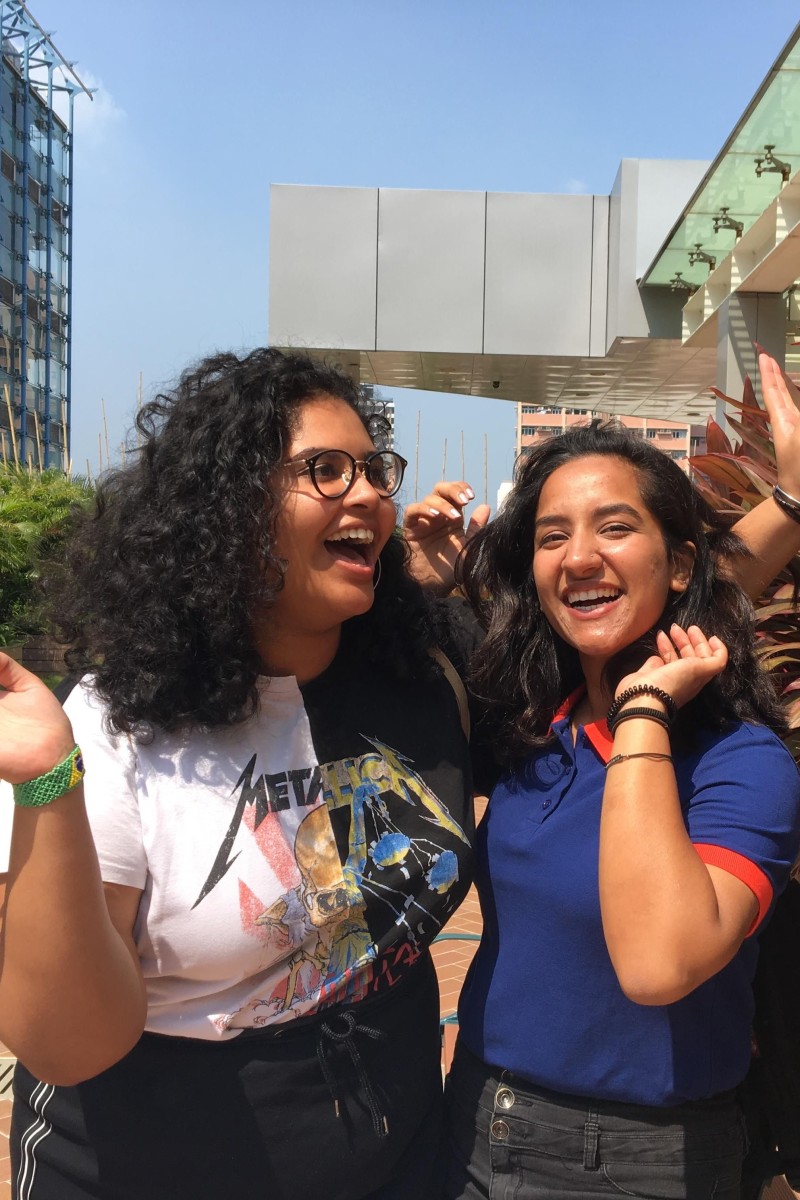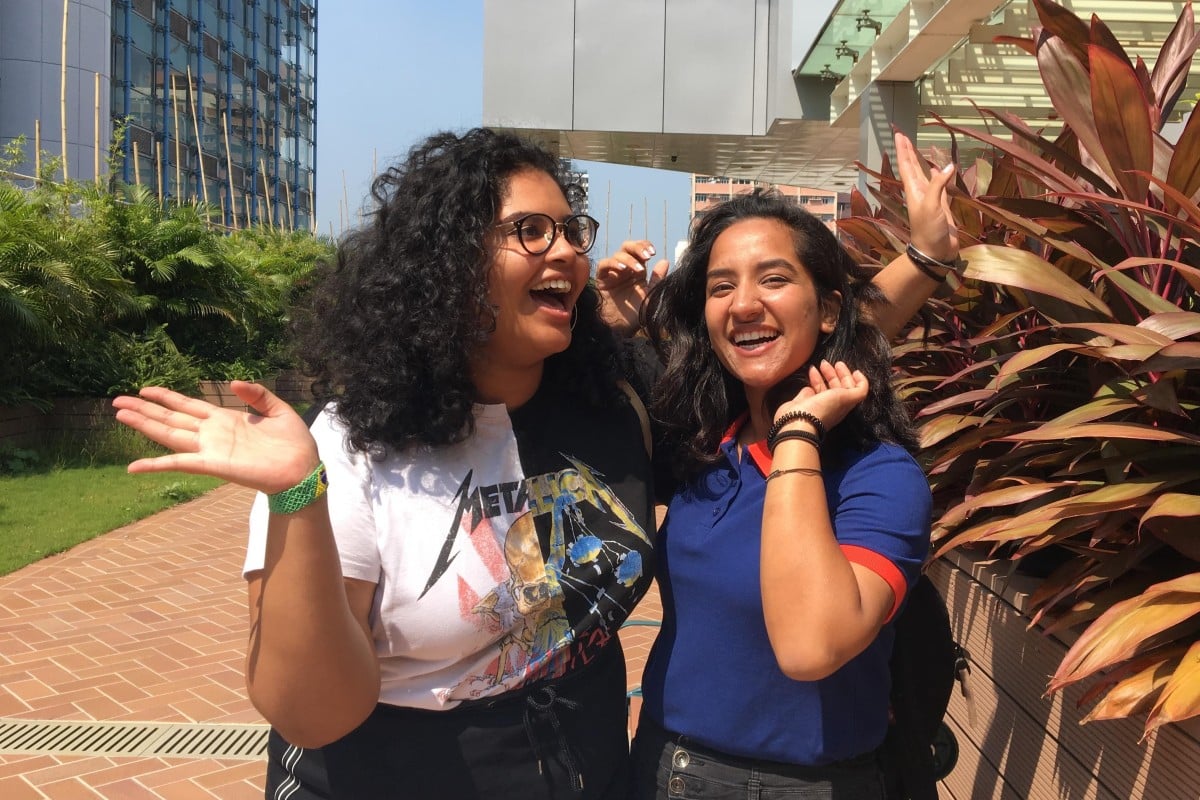
Roadside Rumours podcast hosts discuss growing up as Indians in Hong Kong, being ‘older sisters’ for listeners
- Kawaljot Kaur and Sanika Kulkarni met while studying at the University of Hong Kong and launched their podcast in 2019 to share diverse stories in Hong Kong
- In their first two seasons, the pair spoke to members of the queer community and a domestic worker – and even covered taboo topics like sex
 Roadside Rumours’ co-founders Sanika Kulkarni (left) and Kawaljot Kaur bonded as they were asking similar questions about identity and belonging. Photo: Handout
Roadside Rumours’ co-founders Sanika Kulkarni (left) and Kawaljot Kaur bonded as they were asking similar questions about identity and belonging. Photo: Handout Kawaljot Kaur was born in Hong Kong, attended a local school and speaks Cantonese. Still, she feels the term, “Hongkonger” does not encompass her identity.
“It’s kind of difficult to call myself just a Hongkonger because I still have my Punjabi identity, but I don’t fully relate to being just that as well,” said the 24-year-old, whose family is from the Indian state of Punjab and who now calls herself a Punjabi-Hongkonger.
But in the midst of her identity crisis, Kaur found a kindred soul in Sanika Kulkarni, who was born in India, came to Hong Kong when she was eight and went to an international school. They met while studying the same subject at the University of Hong Kong (HKU).
“I feel like I’m from Hong Kong because I’ve lived here for so long ... but am I a Hong Kong Indian? Or am I just an Indian living in Hong Kong?” Kulkarni, now 22, recalled thinking.
Despite their drastically different upbringings, the two found themselves asking similar questions about identity and belonging. Their dormitory chats eventually sparked the idea for Roadside Rumours, a podcast they launched in 2019 to share diverse stories from Hong Kong. They have since produced two seasons and are gearing up to start releasing the third one this summer.
Before they became so confident in discussing their identities on a public platform, the two struggled to find a place where they fit in.
Kaur and her siblings are the first generation in their family to be born in Hong Kong. She studied in an English-speaking primary school where most pupils were from India, the Philippines and Pakistan. But then, she went to a secondary school where she had to learn Cantonese.
“I was suddenly put into a setting where I was the only Indian in the whole school,” Kaur shared.
“The teachers were still not really sure what to do with the non-Chinese speaking (NCS) students because that was the first year that they received NCS students.”
While she was often exempted from lessons such as Chinese and Chinese history, she and two other students would be singled out for Chinese lessons catered for them.
She learned to speak Cantonese by the time she was 12, but she felt the embarrassment of being set apart. This was not the sole reason she felt out of place.
Children of asylum seekers struggle with Chinese lessons during Covid-19
Once, while on a shuttle bus for a field trip, she recalled comments from her classmates when they passed the Sikh temple in Wan Chai.
“One of them ... pointed at the Sikh temple, and they were like, ‘Do you know that place?’ And I was ... embarrassed to be put on the spot,” she said.
Instead of being honest by telling them she went there every Sunday since her family is Sikh, she lied: “I don’t know what that place is.”
Kaur reflected on the experience, saying she felt so uncomfortable with how classmates made assumptions about her that “it’s almost like I had to hide that part of my identity”.
Eventually, she switched to a different school that was less segregated and had more students from a similar background as hers, making it much easier for her to adjust and fit in.
Pakistani engineer overcame racism, sexism, language barrier in Hong Kong to succeed in STEM
For Kulkarni, whose international school classmates were from all over the world, her student years were not as isolating as Kaur’s. Instead, she felt disconnected from her heritage.
“International school was such a social bubble ... the dominant culture would be predominantly Western,” she said. “The whole point of that school setting was diversity. We all must accept each other and all of that, but I felt like it’s not ... where you can celebrate your own unique culture.”
She was so sheltered that she never heard of the term “ethnic minority” (EM) until going to HKU.
The two disagree with how the term is used in the city. Kaur said: “For the government statistics they need to have a term to categorise us. So officially, the term ‘ethnic minority’, it kind of makes sense ... But it’s just not the way it’s used in society.”
She gave examples of how the term was vilified in media, highlighted in crime reports but seldom used to discuss people’s achievements.
“For brown people, it’s mostly ‘immigrants’ or ‘EM’, but then when it comes to Caucasians in Hong Kong, it’s ‘expats’,” Kaur explained. “It’s just the way it’s used and the negative connotations that come along with it.”
Diversity and the issues surrounding it are common topics on the pair’s podcast.
In the first season, they mainly interviewed friends and discussed campus life and ethnic minority experiences.
Photo exhibition shows how Hong Kong ethnic minority youth picture belonging
But for the last episode, they interviewed two models, one who is Black and the other Nepalese, who shared about their experiences in the industry in Hong Kong. It inspired the co-hosts to expand the podcast’s scope.
“Season two was more well thought out and ... we invited people outside of our social circles,” said Kaur.
They spoke to members of the queer community and a domestic worker, and even discussed topics commonly seen as taboo, such as sex and masturbation.
Hong Kong students don’t receive adequate sex education, survey reports
The hosts received positive feedback from listeners who said they never had the chance to talk about these issues before. For Kaur and Kulkarni, these conversations were also rare for them while growing up.
Kaur shared: “I ... see myself and Sanika like these older sisters that these girls didn’t have.”
Now that the two have graduated and are working full-time – Kaur as a copywriter and Kulkarni as a teacher – it is tough to record episodes, but they remain unswayed in their dedication.
“If we do have that privilege of having a platform where we can discuss some of these issues and amplify some of these voices, we should do it,” Kaur stated.
Encompass 包含
Include comprehensively.
Kindred 相似的
Similar in kind; related.
Drastically 大幅
Extremely; very.
Segregated 種族隔離
Separated or divided along racial, sexual, or religious lines.
Predominantly 佔絕大多數地
Mainly; for the most part.
Vilified 醜化
Speak or write about in an abusively disparaging manner.
Connotations 隱含意義
An idea or feeling which a word invokes for a person in addition to its literal or primary meaning.
Unswayed 不為所動的
(Of a person) not influenced or affected.
